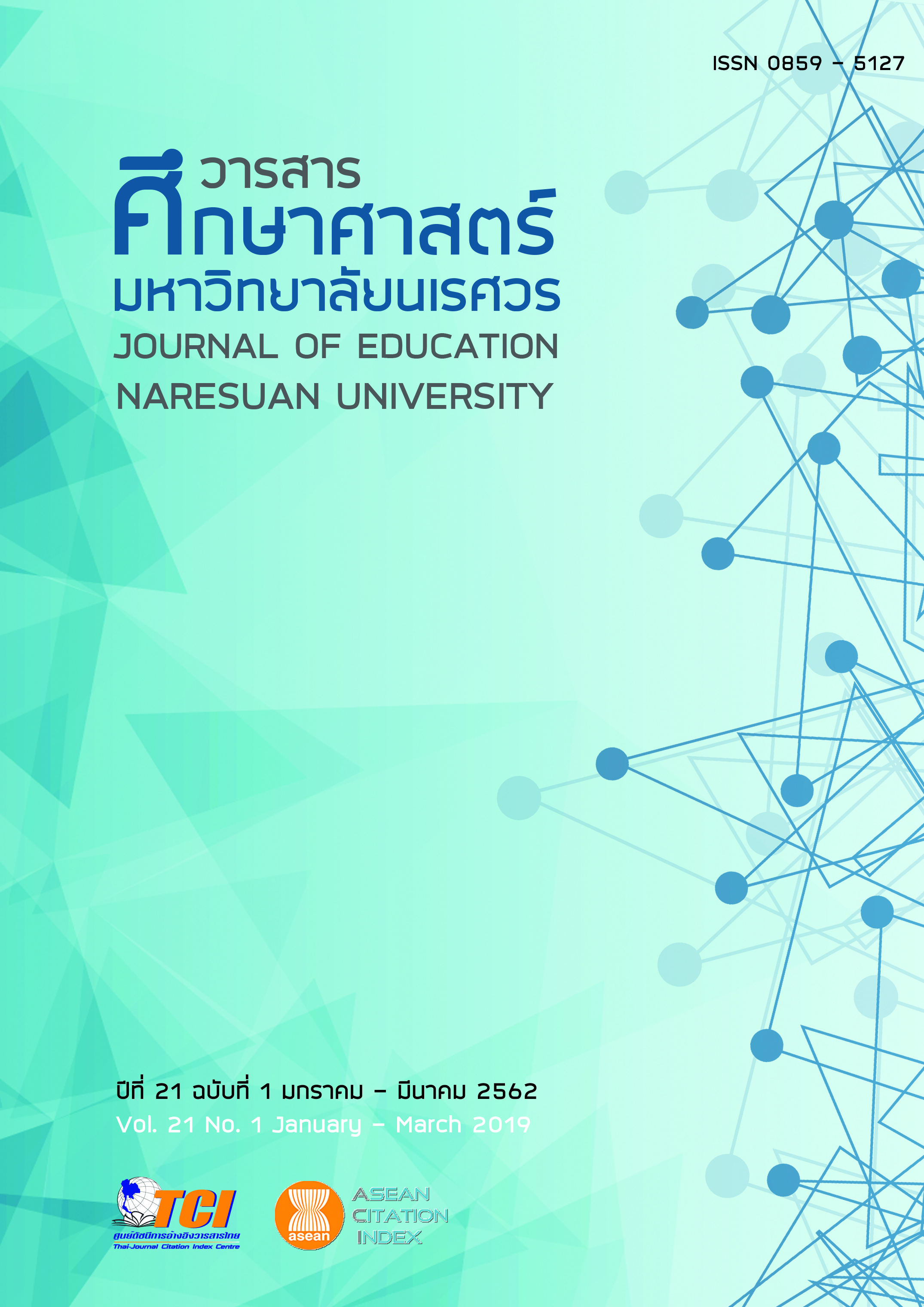การพัฒนารูปแบบบทเรียนบน TABLET PC ร่วมกับการเรียนรู้โดยใช้ปัญหาเป็นฐาน (DEVELOPMENT OF TABLET-BASED LEARNING MODEL WITH PROBLEM BASED LEARNING)
Main Article Content
Abstract
งานวิจัยนี้ มีวัตถุประสงค์เพื่อ 1) พัฒนาและหาประสิทธิภาพของรูปแบบบทเรียนบน Tablet PC ร่วมกับการเรียนรู้โดยใช้ปัญหาเป็นฐาน วิชาระบบปฏิบัติการคอมพิวเตอร์ทางการศึกษา 2) ศึกษาผลสัมฤทธิ์ทางการเรียนของนิสิตที่เรียนด้วยรูปแบบบทเรียนบน Tablet PC ร่วมกับการเรียนรู้โดยใช้ปัญหาเป็นฐานวิชาระบบปฏิบัติการคอมพิวเตอร์ทางการศึกษา 3) ศึกษาความพึงพอใจของนิสิตที่เรียนด้วยรูปแบบบทเรียนบน Tablet PC ร่วมกับการเรียนรู้โดยใช้ปัญหาเป็นฐานวิชาระบบปฏิบัติการคอมพิวเตอร์ทางการศึกษา กลุ่มตัวอย่างคือ นิสิตการศึกษาบัณฑิต สาขาคอมพิวเตอร์ จำนวน 25 คน ที่ศึกษาในวิชาระบบปฏิบัติการคอมพิวเตอร์ทางการศึกษา คณะศึกษาศาสตร์ มหาวิทยาลัยนเรศวร ปีการศึกษา 1/2558 เครื่องมือที่ใช้ในการวิจัย ได้แก่ 1) บทเรียนบน Tablet PC วิชาระบบปฏิบัติการคอมพิวเตอร์ทางการศึกษา 2) แบบประเมินผลสัมฤทธิ์ทางการเรียน 3) แบบประเมินความพึงพอใจของนิสิตต่อรูปแบบบทเรียนบน Tablet PC ร่วมกับการเรียนรู้โดยใช้ปัญหาเป็นฐาน การวิจัยดำเนินตามรูปแบบขั้นตอน ADDIE Model ผลการวิจัย พบว่า 1) รูปแบบการเรียนด้วยบทเรียนบน Tablet PC ร่วมกับร่วมกับการเรียนรู้โดยใช้ปัญหาเป็นฐาน วิชาระบบปฏิบัติการคอมพิวเตอร์ทางการศึกษา ที่พัฒนาขึ้นมีประสิทธิภาพ E1/E2 เท่ากับ 88.8/86.8 เป็นไปตามเกณฑ์ที่กำหนดไว้ 80/80 2) ผลสัมฤทธิ์ทางการเรียนระหว่างคะแนนก่อนเรียนและหลังเรียนพบว่า คะแนนหลังเรียนของนิสิตสูงกว่าก่อนเรียนอย่างมีนัยสำคัญทางสถิติที่ระดับ .05 3) ความพึงพอใจของนิสิตที่ได้เรียนรู้ด้วยรูปแบบบทเรียนบน Tablet PC ร่วมกับการเรียนรู้โดยใช้ปัญหาเป็นฐาน มีค่าเฉลี่ยอยู่ในระดับพึงพอใจมาก ( = 4.27)
DEVELOPMENT OF TABLET-BASED LEARNING MODEL WITH PROBLEM BASED LEARNING
The purposes of this study were 1) to develop and validate the efficiency of the Table- Based Learning Model with Problem-Based Learning (TBL-PBL) for Operating System in Educational Course of Bachelor of Education Program, Faculty of Education, Naresuan University, 2) to compare pretest and posttest learning achievement of students who studded by Tablet Based-Learning with Problem-Based Learning (TBL-PBL), and 3) and to study students level of satisfaction after study Tablet-Based Learning Model with Problem Based Learning (TBL-PBL). The samples in this study were 25 students in Bachelor of Education Program, Faculty of Education, Naresuan University, in the academic year 2015, District, Phitsanulok Thailand. The research instruments of this study were 1) Tablet-Based Learning Model with Problem-Based Learning for Operating System in Education Course, 2) the learning achievement test, and 3) the satisfaction survey. This research was carried out by a step ADDIE Model. The results of this research indicated that: 1) the efficiency of Tablet-Based Learning Model with Problem-Based Learning (TBL-PBL) was 88.8/86.8 which was higher than the standard criterion of 80/80, 2) for the learning achievement, the students’ posttest score after learning with TBL-PBL were higher than those before learning at the statistically significant level of .05, and 3) and it was found that the students’ satisfaction after using the TBL-PBL was at a “good” level.
Article Details
The owner of the article does not copy or violate any of its copyright. If any copyright infringement occurs or prosecution, in any case, the Editorial Board is not involved in all the rights to the owner of the article to be performed.
References
Chan-o-cha, P. (2016). Startup Thailand 2016 under the theme "Unite to Rise energize Startup to move on Thailand's economy." Retrieved September 27, 2016, from https://www.admissionpremium.com/news/1377 [in Thai]
DeNeen, J. (2016). 21 Reasons to use tablets in the 21st century classroom. Retrieved September 27, 2016, from https://www.teachthought.com/uncategorized/reasons-to-use-tablets-in-the-21st-century-classroom
Indiana State University. (2016). ADDIE Model. Retrieved September 27, 2016, from https://www.indstate.edu/education/iits/addie-model
Jaroensettasin, T. (2016). Educational Thailand 4.0 in the context for sustainable development. Retrieved September 27, 2016, from https://www.thaigov.go.th/index.php/th/news-ministry/2012-08-15-09-39-20/item/106545 [in Thai]
Jinayon, S. (2014). Policy framework and strategic plan Goals and action plans during the year 2009-2013. Retrieved March 1, 2016, from https://www.ecpe.nu.ac.th/web/download/yuttasartNU.pdf [in Thai]
Kamani, T. (2011). Teaching science: Knowledge to the learning process effective. Bangkok: Chulalongkorn University Press. [in Thai]
Kemp, Jerrold E. Morrison, Gary R. Ross, & Steven M. (1998). Designing effective instruction. Upper Saddle River, NJ: Merrill.
Laohajaratsang, T. (2016). The effects of tablet-based learning on pre-service teachers' learning experiences at Chiang Mai University. Retrieved September 27, 2016, from https://ieeexplore.ieee.org/document/6820165/
MOCA. (2016). Mobile classroom application. Retrieved September 29, 2016, from https://www.pressmart.com/moca/MICHAEL TRUCANO
Monash University’s Education Centre. (2016). Benefit of tablet-based learning and teaching. Retrieved September 27, 2016, from https://monash.edu/eeducation
Naresuan University. (2016). Plan 5 year for Naresuan University (2012-2016). Retrieved September 27, 2016, from https://www.nu.ac.th [in Thai]
Naresuan University. (2016). Bachelor degree student guide 2012 academic year. Phitsanulok: Ratanasuwan Printing. [in Thai]
Ratanasuwan, D. (2016). Thailand to further education. Retrieved September 27, 2016, from https://www.moe.go.th/websm/2016/aug/340.html [in Thai]
Roungrong, P. (2008). The survey of context and problem for teaching. Phisanulok: Faculty of Education, Naresuan University. [in Thai]
Roungrong, P. (2009). The application of Problem-based Learning with media and activity on network for subject of 355543 application programs computer for education (Research report). Phisanulok: Faculty of Education, Naresuan University. [in Thai]
Roungrong, P. (2013). Develop of tablet learning. Bangkok: Pronticha Printing. [in Thai]
Roungrong, P. (2014). Development of tablet-based learning model with cooperative learning. In International Conference on Education 2014 (pp.153-177). Hungary: Szombathely.
Roungrong, P. (2014). Tablet PC: Thai educational media in the 21st century. In the Conference on Education and Human Development in Asia (COHDA 2014) (pp. 1-11). Japan: Hiroshima.
Roungrong, P. (2015). The development of tablet-based learning model with Gagne's nine events of instruction. In 18th International Academic Conference (IISES 2015) (pp. 617-627). United Kingdom: London.
Srisa-ard, B. (2002). Basic research (7th ed.). Bangkok: Suweeriyasan. [in Thai]
Suwannawong, S. (1995). Theories and techniques in sampling. Bangkok: Odian Store. [in Thai]
Trucano, M. (2016). Tablets in education. Retrieved September 29, 2016, from https://blogs.worldbank.org/edutech/tablets-education
UK Centre for Materials Education. (2016). Learning materials in a problem-based course guides for lecturers v.2009. Retrieved March 14, 2016, from https://www.materials.ac.uk/guides/pbl.asp
Wikipedia. (2016). ADDIE Model. Retrieved March 30, 2016, from https://en.wikipedia.org/wiki/ADDIE_Model


